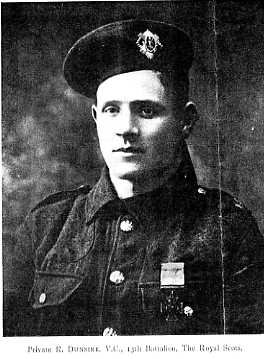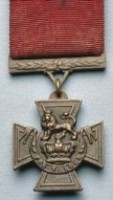THE FORGOTTEN HERO - ROBERT DUNSIRE VC
 |
Robert Anderson Dunsire was born in Buckhaven on the 24th November 1891. His father was a contractor at the Dunnikier Pit in Kirkcaldy, where the family moved when Robert was a young boy. At the outbreak of war in 1914, Robert was a miner at the Fife Coal Company’s Rosie Pit, living at 210 Denbeath, Methil with his wife Catherine (nee Pitt). Responding to Lord Kitchener’s call for volunteers, he enlisted, along with many of his fellow miners, in January 1915 joining the 13th Battalion Royal Scots (Lothian Regiment). This Battalion was formed at Edinburgh in September 1914 as part of Lord Kitchener’s Second New Army. Attached to 45th Brigade, 15th (Scottish) Division, it landed in France 7-13 July 1915, serving with distinction on the Western Front for the remainder of the war It was during the battle of Loos, fought between 25th September and 13th October 1915 that Private Robert Dunsire won the Victoria Cross for acts of supreme gallantry. An extract from the London Gazette, No. 29371, dated 16th November 1915 records the following:- |
 |
For most conspicuous bravery on Hill 70, 26th September 1915, Private Dunsire went out under very heavy fire and rescued a wounded man from between the firing lines. Later, when another man considerably nearer the German lines was heard shouting for help, he crawled out again, with utter disregard to the enemy’s fire and carried him in also. Shortly afterwards the enemy attacked over this ground.” |
A personal account of this deed is given in a letter written home by Private Dunsire on 30th September.
“I was sitting on the parapet of the trench looking over the battlefield of Hill 70 when I noticed a man crawling over the parapet of the ridge which separated our parapet from theirs.
With the glasses I made out he was one of our lads so I made a dive out of our trench. Got him on my back, and brought him in. I had not been back a quarter of an hour when I noticed another lad.
This time it was worse than the first, as the shells were bursting all around, and when the snipers saw me they kept up a continuous fire.
I can’t tell you how I escaped being hit, as I was a good target, running about 100 yards with a man on my back. I was still in the firing line when the Colonel of an East Yorkshire regiment shook hands with me and told me I was a brave lad. I told him anybody would have done the same.”
In this letter, Private Dunsire mentioned to his wife that he thought he had been recommended for a Distinguished Conduct Medal.
The news that reached him in the trenches on 20th November must then have been something of a shock – a telegram announcing that Private Dunsire had been awarded the most prestigious gallantry medal in the British Armed Forces, the Victoria Cross.
After celebration in the Battalion, he was sent home immediately on 10 days leave.
From all accounts, it is clear that Robert was a shy and modest character. However, if he expected to spend his leave quietly at home with his young wife he was sadly mistaken.
The news of the award of the Victoria Cross travelled before him; a self-conscious Private Robert Dunsire received a taste of things to come on his arrival at Kirkcaldy railway station, where crowds of well-wishers surrounded him.
Travelling to Denbeath by tram, he found little relief from public attention - newspaper reporters, well-wishers and local dignitaries all beseiging his small miner’s house.
News of Private Dunsire’s Victoria Cross was received with excitement and pride in an otherwise grim period with the local newspapers printing endless lists of war casualties.
His leave was spent in a round of public functions, factory visits and formal dinners. One such was given by Buckhaven and Methil Town Council in the White Swan Hotel, and later, in the Gaitey Theatre, he was presented with War Loan Script along with a 'gold watch' and a handsome piece of jewllery for his wife. Such was his standing within the community that over two thousand people contributed towards the gifts.
On 29th November 1915, the Provost, Sir Robert Cook Lockhart, admitted Private Dunsire as a Guild Brother Burgess and Freeman of the Royal Burgh of Kirkcaldy.
With his leave extended by a few days, Private Dunsire travelled to Buckingham Palace where King George V presented him with the Victoria Cross.
The shy soldier told reporters afterwards that he felt more nervous meeting the King than when facing German bullets! “I congratulate you on your brave action” the King said “and I trust you will live long to wear your decoration.” Unfortunately, this was not to be.
With the VC ribbon proudly sewn onto his uniform, Private Dunsire rejoined his Battalion in the trenches.
On 30th January 1916, the newly promoted Lance-Corporal Dunsire was mortally wounded by a trench mortar. He was carried to a dressing station but died before assistance could be rendered. His recorded last words were fittingly heroic “Don’t bother about me lads. Leave me here, I’m going”.
A fuller account is given in an article in the “Leven Advertiser” dated 10th February 1916.
"He has been promoted since he secured the world’s greatest Military Distinction, but has not lived long to enjoy the honour so deservedly won.
Information came to hand on Sunday that he had been killed by a trench mortar. Captain Yule of Giffan Park House, Dysart, also of the 13th Royal Scots, brought home the melancholy tidings. He reached his home on Sunday on short leave from the front, and when interviewed said:"
“Lance Corporal Dunsire had been in a bomb-proof shelter along with two comrades when a shell from a German trench mortar fell from the corrugated roof. Dunsire and his comrades were all hit by the fragments from the bursting shell. The VC was terribly injured, and all three were hurried with the utmost dispatch to the first-aid post and from there to the hospital. Dunsire was unconscious all the time and died immediately after admission to hospital.
One of his comrades also expired; we were all terribly cut up about the affair” said Captain Yule. “He was one of the finest soldiers in the Battalion. It so happened that he was for the time being out of his machine-gun section in which he had been promoted Lance Corporal and to which he was to return immediately the spell of trench work was over.
We experienced a terrific bombardment at the time. I was at Battalion H.Q. when the thing happened, but on learning of what had occurred, I went down immediately to the hospital. Dunsire never regained consciousness and passed away directly on admission to hospital. He was badly wounded and his case was hopeless from the first. We are all feeling his loss keenly. “
Dunsire and his comrades were given a military funeral, which was attended by a Company of Gordons. Crosses were erected over the graves. His belongings were sent home. “It will be of some comfort to his relatives to know that his superiors thought highly of him, and had he been spared, he would have been promoted to the rank of Sergeant in his machine-gun section. I am deeply sorry to be the bearer of such sad news.”
A further article appeared in the “Leven Advertiser” on the 17th February 1916.
The late Lance Corporal Dunsire VC
At a meeting of the Kirkcaldy Town Council on Monday night, Provost Sir Robert Lockhart referred to the death of Lance Corporal Robert Dunsire VC, 13th Royal Scots, who recently had conferred upon him the Freedom of the Burgh.
The Provost said that ten days ago he had received a letter from the VC saying that he was in the trenches.
“It is hard to realise that this bright and cheerful spirit had passed beyond their ken. They deeply mourned the loss of this gallant young hero, but rejoiced to know that though the years he spent on Earth were but few, he lived a full life.
He had done his whole duty, and his name and bravery would never be forgotten. A typical Scottish soldier, he nobly upheld the finest traditions of our race, modesty combined with splendid courage and devotion to duty.”
Lance-Corporal Dunsire is buried in Grave No. 18, Mazingarbe Communal Cemetry, Pas de Calais, France. The inscription on his gravestone reads:
Private ROBERT DUNSIRE VC
18274, 13th Bn., Royal Scots
who died age 24
on 30 January 1916
Born at Buckhaven. Son of Thomas and Elizabeth Anderson Dunsire; husband of
Catherine Pitt Stewart (formerly Dunsire), of 107, Denbeath, Methil, Fife.
Remembered with honour
He is also commerated on the Methil War Memorial and on a plaque to the fallen of the Great War in Wellelsey Parish Church Methil and also the Kirkcaldy war memorial.
His Victoria Cross is on public display (One of only seven ever won by the Regiment) in the Royal Scots Museum at Edinburgh Castle and his actions on that day are recorded in two books
- "Scotland's Forgotten Valour" by Graham Ross, The Islands Book Trust
- "History of the Royal Scots 1914-19" by Major John Ewing MC.
Acknowledgements:
Archive material held at the Lower Methil Heritage Centre, Methil
“The Forgotten Hero”, East Fife Mail, 31st January 1996 by Adam Smith, Lower Methil Heritage Centre
First World War, Martin Gilbert, 1994, Weidenfeld and Nicholson, London
The World War I Data Book, John Ellis and Michael Cox, 1993, Aurum Press, London
Commonwealth War Graves Commission - http://www.cwgc.org/
Notes: (click here to return to top)
The house at 210 Denbeath became 210, Dee Street, Denbeath; however, it was demolished in 1988 when new bungalows were built on the site.
The Rosie Pit, owned by Bowman & Company, was situated near Buckhaven. The first shaft was sunk in 1879; Shaft No2 was sunk in 1881. The pit was taken over by the Wemyss Coal Company in 1905 and closed in December 1953.
Lord Kitchener: Horatio Herbert, Field Marshall, 1st Earl Kitchener of Khartoum; 1850-1916. Secretary of State for War. Drowned in 1916 when HMS Hampshire, in which he was travelling to Russia, struck a mine off Orkney.
Loos: German advances in the east resulted in the Russian Army asking their allies, France and Britain to launch an attack in the west to reduce the pressure on their forces. The result was that the French attacked the German trench lines in Champagne, the British at Loos. The attack at Loos was launched on a six-and-a-half mile front with the British releasing 150 tons of chlorine gas across No-Man’s land from 5,243 gas cylinders. British troops advanced at one point over 4,000 yards, with one battalion being led in its assault by men dribbling a football across No-Man’s Land!
The 13th Battalion Royal Scots were in the heat of the battle where they suffered heavily, losing 325 men in one two-day period. Total British casualties for the battle amounted to 385 officers and 7,861 men killed or wounded. So appalled were the Germans at the effect of their machine-guns that they called the battle the ‘Field of Corpses of Loos’ (Der Leichenfeld von Loos). Among those killed during the latter stages of the battle was Second Lieutenant John Kipling, son of the author, Rudyard Kipling. His body was never found.